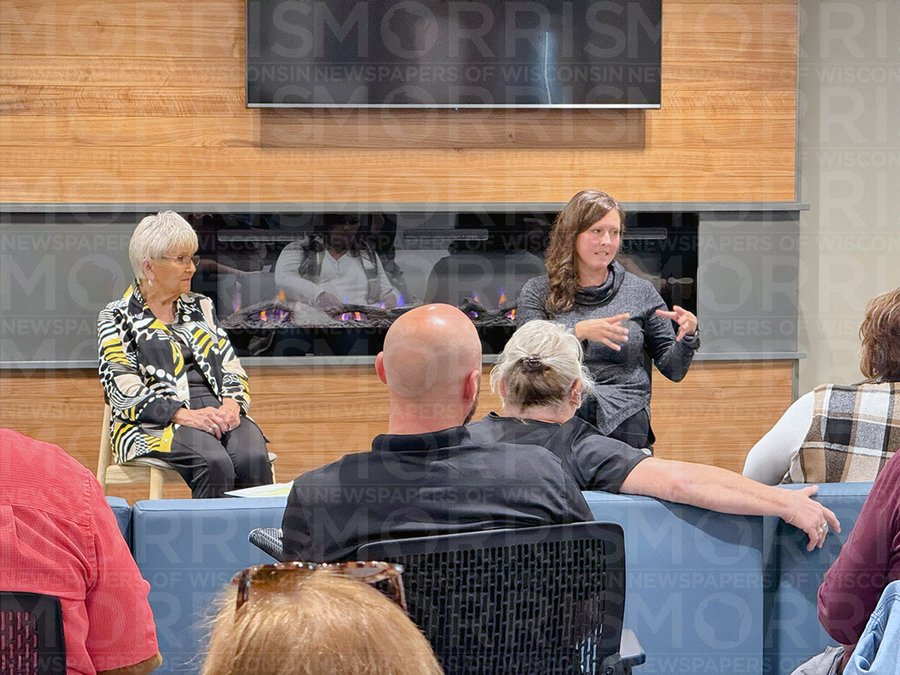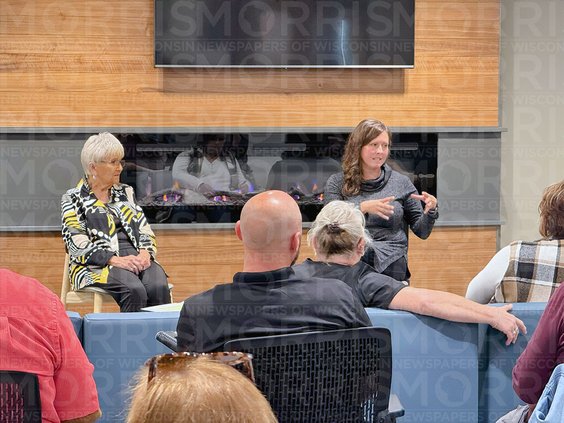MONROE — Separating the facts from rumors was the plan behind a morning fireside chat at the Green County Family YMCA. The Monroe Chamber of Commerce and Industry, along with representatives of its members, private citizens, Mayor Donna Douglas and City Administrator Brittney Rindy sat down for a public conversation in the local YMCA’s new Fireside Lounge Wednesday morning, Oct. 8. About three dozen people in all attended.
“Thank you guys for coming — we’re happy to host. This is one of the main reasons why we built this facility, to have conversations like this and bring everybody together,” said Trent Henning, Executive Director of the YMCA.
This was the first fireside chat Monroe Chamber is hosting. The organization is hoping to do another in spring, and then continue twice a year moving forward.
“It’s just a way of learning about what’s going on around our city,” Marcey Ciaccio, executive director of the Monroe Chamber of Commerce and Industry. “It’s just a way for us to learn the facts of what are happening rather than learning through rumor.”
The chat focused on several upcoming or current projects around the city. Topics included the wastewater treatment plant, industrial park, the upcoming roundabout on 13th Street, street projects, budget planning, taxes and potential development for residential, commercial and industrial zones within the city’s borders.
“There’s a lot of big projects going on around Monroe and Green County as a whole right now,” Rindy said. “Some of these things really start four or five years prior” until the process can be played out, from initial planning to securing funding to shovels into the ground.
The city has a monthly newsletter to give updates on a variety of projects, Rindy said. Project Fast Fact: Fresh Drop is the newest informational series that Rindy has lined up to keep city business transparent and accountable.
The wastewater treatment plant has been needing an update, and that project should soon become a reality. About four years ago, the city realized it was closing in on capacity limits. Needing to stay within thresholds set by the Wisconsin Department of Natural Services (DNR), an expansion is necessary.
“Our wastewater plant in Monroe is unique from the fact that we have so many wet industries. (It) operates as if we are a municipality of 90,000 when we only have 10,000 — and that’s because we have the breweries and the cheese factories that discharge a lot,” Rindy said. “Because of that, it’s also funded a lot through those industry rates.”
Without expanding the capacity of the wastewater plant, local factories themselves wouldn’t be able to expand, nor would a new business in those industries be able to open here.
“We are going through a design of expanding the wastewater treatment plant. We are expected to have 90% designed by June of next year, and then going out for bid in July, with a hopeful groundbreaking in 2027 — that’s obviously pending any funding or approvals,” Rindy added. “The goal is to fund that through the current (wastewater) fund balance at the rates currently, as well as refinancing some loans.” Regular taxes go to the city’s general fund, but water and wastewater go to its own enterprise fund. “They do not take tax dollars to support their operations.”
There are clean water loans through the states that have a lower interest rate, she said, and there are other grants that will support it.
“I hear frequent comment and concern that the city is building this big thing and how are we going to fund that, but the truth is, because it is heavily used by the industries, it is heavily funded by the industries. They pay for it when they discharge to us,” she said.
Rindy added that there will be a 3-5% increase over five years for all wastewater charges. Residential users will still see a small increase on their bill for their discharge — about equivalent to inflationary growth, Rindy said. “It’s nothing that is going to be overly significant.”
The city purchased and annexed 50 acres north of County DR to expand the industrial park back in February using fund balances that remained. No new taxes would come of it. Rindy also said that there is no pending business ready to move into the new land, but instead it was the city investing for the future. There is only one available lot remaining in the current industrial park, and having more land ready to develop could entire a business to relocate or start up.
“Often it is always a thought that we need a big industrial business to come in so Monroe can grow; we need something bigger,” Rindy said. She went on to say that she as done business retention visits and research with Olivia Otte at Green County Development Corporation, and a missing factor in that logic is that local businesses would also like to expand. “A lot of our current industries and larger businesses also have the need for a larger workforce — there’s more work that they could be doing, but they can’t because they don’t have the capacity with the workforce. Being able to have the housing for them, and also to have the ability or opportunity to stay and expand within the city as well is important.”
The conversation made a clean segue into the area’s housing availability: from a lack of overall inventory, to higher priced newly built homes, to future developments and potential zoning changes. Richland Heights is the subdivision currently being developed on the far east side of town off of 32nd Avenue between Northside Elementary and the new Monroe High School campus. The owners of that land also will own the land the current high school sits on, with the land-swap between the school district and the owners finalizing once all school functions move to the new facility, currently expected to be in late summer or early fall of 2026. The current school land is zoned as instructional, and could be re-zoned to residential, which would open up more lots for new homes to be built.
Dan Williams of Green County Human Services was in the crowd and said that the men’s resource center and Family Promise would like to expand in order to help out the unhoused residents of the city. However, with the current federal government shut down, grants and funding are lacking, and the organizations want to set up housing for long-term success and not just “drop ins.”
“Funding is the main issue. We went after a lot of grants from the state, but now that money is tied up because of the unfortunate federal shutdown. We’re still securing grants and working with our partners to see what kind of funding we can get. That’s the huge barrier. It’s extremely cost-prohibitive to have a shelter that’s program-based and just have folks get stuck there. We want to help them through their journey, and recognizing that there are limited options for transitional housing,” Williams said. “Brittney and Jeff (Neises, Property Code Administrator) and Mayor Douglas have been sitting in a lot of those conversations. There’s a lot of work happening, but we’re really at the mercy of funding.”
The street project along 32nd and 31st Avenues near the new high school are currently being widened and are shut down to thru-traffic. Rindy said the first phase of the project should be on schedule and wrapped by Thanksgiving. The project will resume with Phase 2 in the spring when the weather will allow. Phase 2 includes a roundabout at 13th Street, County K, County KK and 31st Avenue. Rindy added that there are no specific plans for a new commercial enterprise to be developed in the area, but hinted that there has been interest by Kwik Trip to add a second storefront in Monroe, as well as Casey’s General Store gas station showing interest.
“I think it’s a pretty safe bet that there will be another Kwik Trip in Monroe — we just don’t know where, yet,” Rindy said. “I think there’s also a discussion with Casey’s, but nothing that’s come my way yet.”
Menards, meanwhile, is re-evaluating its strategies. Rindy is hopeful that in 2026 or 2027, the home store franchise might come back to the table and look at building in the city. Menards bought a large plot of land along Aebly Road and N. Highway 69 in 2009 that the city has since annexed.
When the conversation shifted back to taxes and tax dollars, Rindy and Douglas reminded the crowd that the 2026 budget is coming soon. However, Rindy wanted to make sure people understand that just because their home might go up in tax assessed value, doesn’t mean their taxes are going to go up by that amount.
Rindy gave an example that in 2010, a home in Monroe worth $81,000 paid about $2,100 in taxes. In 2024, that same home was valued at $150,000, but taxes rose to the $2,300 range. Another home, worth $126,000 in 2010 paid $3,300, but while nearly doubling in assessed value in 2024 to $248,000, taxes rose just $700. The changes in individual taxes or the general fund have to do with equalization.
She also shared an example breakdown of where city taxes would go. “About 43% of your total property tax payment is used to pay for City-provided services,” Rindy said. She used an example of a home worth $217,400 dollars — the approximate median assessed value of a Monroe home in 2024. “This home would pay approximately $1,562 for its 2024 city services,” she said.
Breaking down the costs for the taxes the city takes, police protection is the largest share (29%) at $456 for the year (less than $35 per month). Fire protection is just $88 per year (about $7.33/month). A pie chart, shown on Page 1, has percentages based on department budgets and net property tax levy, as included in the 2025 Adopted City Budget. In the graphic to the right: A simplistic dollar by dollar breakdown.
One major announcement at the fireside chat was Mayor Donna Douglas announcing she was not going to run for another term. She encouraged anyone interested in running for mayor to “just do it.” She added that Rindy is great to work with, as are the other department heads and common council members.
“I think there’s a lot of people who are qualified to be the mayor of Monroe, especially with having the city administrator and department heads that we have,” she said. “I want to just say it takes someone who likes to communicate and cooperate with your constituents. You need to be engaged in the community, and be transparent. We need to make sure the community knows what’s going on. Monroe is on the move, and if you feel like you could do the job, then I’m sure you could.”
Douglas said she would be 88 years old if she was sworn in again. She has spent more than 50 years representing her constituents and neighbors in some form or another, from a township supervisor, to county board, city council and now as mayor.
“I’ve enjoyed every minute of it,” Douglas said.


